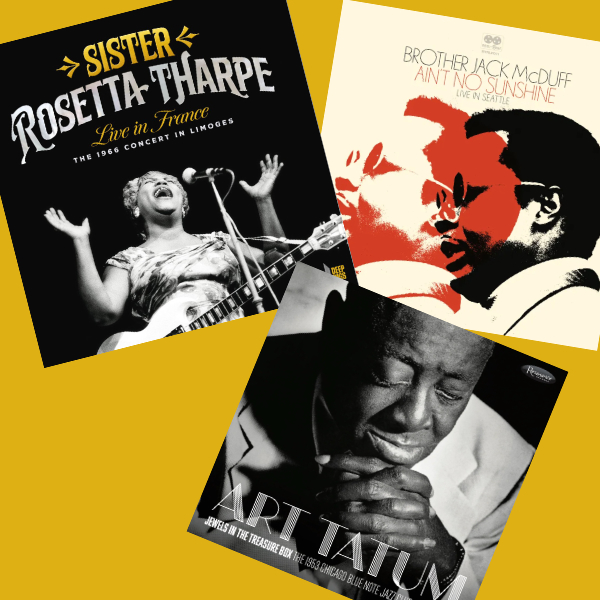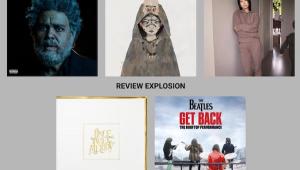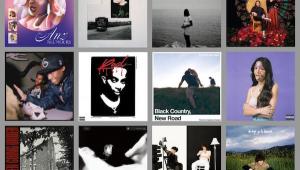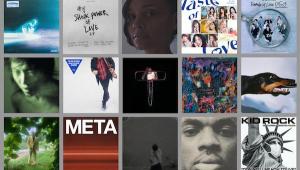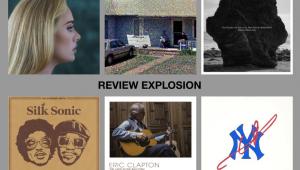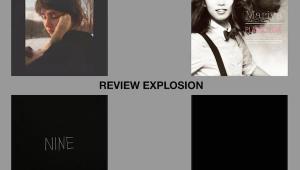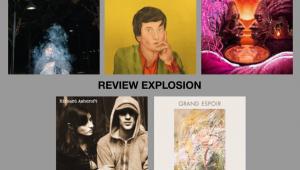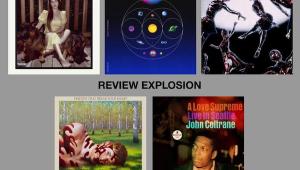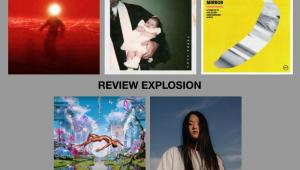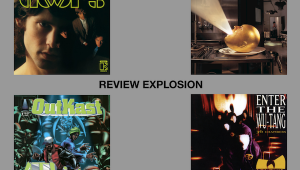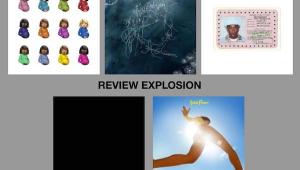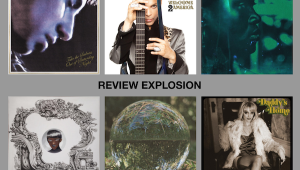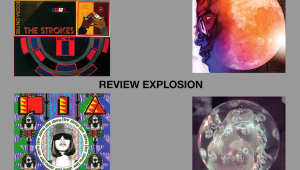Review Explosion, Short Cuts Edition, Vol. 13: A Trio of Record Store Day 2024 LP Releases From Brother Jack McDuff, Sister Rosetta Tharpe, and Art Tatum
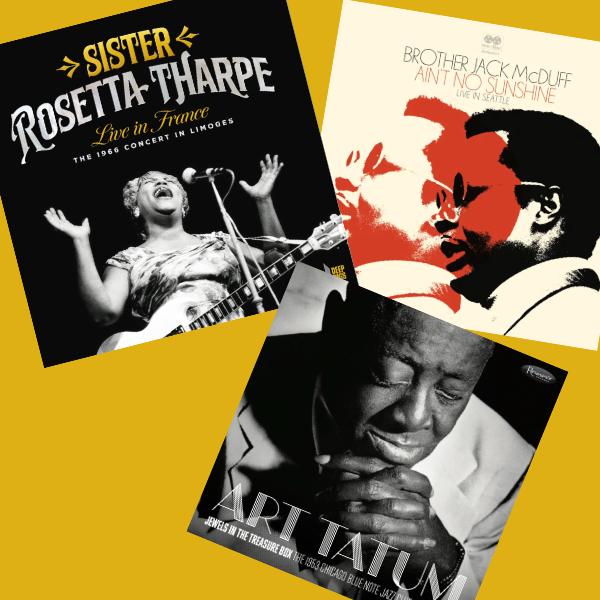
It is not often you get the opportunity to review new titles from three legendary artists of yesteryear like gospel icon Sister Rosetta Tharpe, piano virtuoso Art Tatum, and soul-jazz organ pioneer Brother Jack McDuff on the same day. But this year, all three are being celebrated on Record Store Day 2024 — this year’s first installment of which happens to fall on this upcoming Saturday, April 20 — with newly unearthed, previously unreleased, multidisc live concert recordings. Furthermore, all three of these albums are being presented on 180g audiophile-grade black vinyl, housed in deluxe gatefold packaging, and include booklets containing new essays and period photography of the artists themselves.
The following trio of Short Cuts reviews are my first impressions of these three RSD 2024 releases, and hopefully these thoughts will help you decide whether or not any or all of them need to be on your “must get” list when you venture out for Record Store Day on Saturday. Happy reading — and happy RSD hunting too!
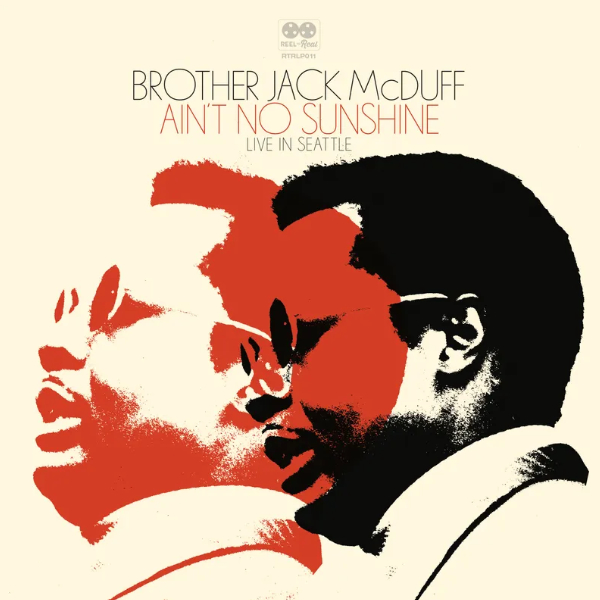
BROTHER JACK MCDUFF
AIN’T NO SUNSHINE: LIVE IN SEATTLE
180g 2LP (Reel To Real)
SRP: $49.99
Limited edition of 1,500 (RSD First)
MUSIC: 9
SOUND: 7
One of the first things I noticed — and immediately dug — about this 1972 archival set by the great soul-jazz organist Brother Jack McDuff is that it doesn’t sound like many of his other recordings. While I do love the music by a number of jazz organists, there has always been an issue of it starting to sound “same-y” (if you will) as one starts to dig down deeper into their catalogs. That is not a slam, but more a reality of the form — especially for those playing in a trio setting.
By 1972, organ-driven soul-jazz was generally well-blended with other musical forms of the time including rock and pop music, creating a headier-still progressive stew. While the organ is a central feature here on McDuff’s new RSD 2024 180g 2LP archival vinyl release from Reel To Real titled Ain’t No Sunshine: Live In Seattle, the sound palate is more diverse than many earlier recordings of his I have heard.
More perspective on the album can be found in the official press release: “After recording over 50 albums throughout the course of the 1960s, McDuff’s sound at the time of this recording is perhaps at its very peak — uncompromisingly bluesy, masterfully arranged, and expertly articulated by his tight-knit ensemble. Leading from the organ chair, McDuff is joined by Leo Johnson on tenor saxophone, flute, and clarinet, Dave Young on tenor and soprano saxophone, Vinnie Corrao on guitar, and Ron Davis on drums.”
Indeed, much spotlight is given to guitarist Corrao — who smokes at points here! — and the horn section of Johnson, Young, and an unidentified trumpet player. A good place to start to get an idea of what I’m talking about is to go to Track 1, Side C for a fiery jam titled “(Unknown).” It feels like McDuff has been assimilating many influences from the times, and the music here reflects the jazz-funk fusion sounds emerging at that time.
My only nit here — which brings my Sound rating on this otherwise nice recording down a numeric notch to a 7 — is that there is far too much surface noise on the pressing I was sent for this review, having heard a number of annoying “non-fill”-type anomalies. Fortunately, they don’t last long, but be aware of them (although they may not occur on the copy you pick up for yourself).
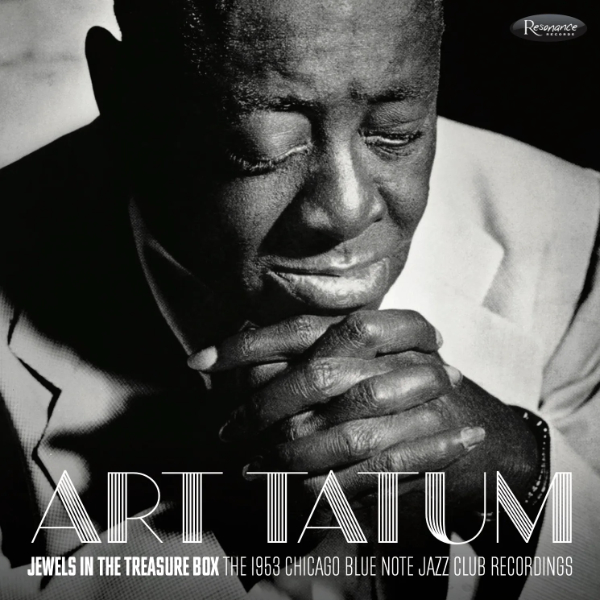
ART TATUM
JEWELS IN THE TREASURE BOX:
THE 1953 CHICAGO BLUE NOTE JAZZ CLUB RECORDINGS
180g 3LP (Resonance)
SRP: $74.98
Limited edition of 2,000 (RSD First)
MUSIC: 9
SOUND: 4.5
I have to admit that when I first read about this release, I initially questioned the need for new Art Tatum recordings to be released in the 21st Century. But then I started to think of the significance of the artist, bit my tongue (instantly halting inner snark), and did a little research. It turns out that while there are indeed no shortage of recordings by this Downbeat magazine and Grammy Hall of Fame music legend — both from in the studio and live on the radio (via radio transcription discs) — there are not really many (if any) complete concert performances of Tatum’s from one venue, especially featuring his second, and reportedly most popular, trio.
Thus, there is the appeal of getting a comprehensive live Art Tatum set like this new 180g 3LP RSD 2024 edition from Resonance, Jewels in the Treasure Box: The 1953 Chicago Blue Note Jazz Club Recordings. From the official press materials, we learn more about what to expect from the package: “A previously unissued 3LP collection of recordings from the incomparable pianist Art Tatum, captured live at the Blue Note jazz club in Chicago in March of 1953 with guitarist Everett Barksdale and bassist Slam Stewart. These recordings were transferred from the original tape reels and mastered for LP by engineer Matthew Lutthans. Containing nearly 3 hours of never-before-heard Tatum at the height of his powers, this deluxe, limited-edition 180-gram 3LP gatefold set includes rare photos and memorabilia from Herman Leonard, Bob Parent, and the Holzfeind family archives (owners of the Blue Note jazz club in Chicago); plus liner notes from Columbia University professor and author Brent Hayes Edwards; as well as statements from Ahmad Jamal, Sonny Rollins, Monty Alexander, ELEW, Spike Wilner, Johnny O’Neal, Michael Weiss, and Terry Gibbs.”
This new album does indeed capture the master musician in fine form in this very appealing trio setting, at a time when Tatum was engaging in rich, new recording creativity and being discovered by new audiences. The latter points are no doubt thanks in part to the efforts of Norman Granz, whose epic 11-volume LP series The Genius of Art Tatum on Clef (and, later, on Pablo) attracted new attention to the artist from younger audiences before his untimely death in 1956.
Jewels in the Treasure Box presents us with a deep-dive snapshot of Tatum and his second trio featuring the aforementioned Slam Stewart on bass and Everett Barksdale on guitar. One especially great moment for me was hearing Tatum and his group cover Rodgers and Hart’s classic tune “Lover” at the end of Side 5, very much in the arrangement and speed of Les Paul’s 1948 sound-on-sound multitracked version (after the slow waltz-like intro, midway, the band kicks into overdrive). These cats are flying on this tune! It is perhaps a bit more than coincidence they perform “Dark Eyes” right after that to open Side 6, a song that was also a staple of Les Paul’s sets with his trio back in the ’40s. Of course, Tatum had performed both of these tunes over the years, so this is just speculation on my part — but it’s worth contemplating for a moment since I’m a longtime, and very deep, Les Paul fan.
Another joy of this collection is simply hearing Tatum speaking between tunes. You not only get to feel his wonderful, gravelly streetwise personality coming through your speakers but — like his progeny, the great Canadian pianist Oscar Peterson — we hear Tatum singing along with his solos as he is working them out on the fly.
There is no question as to the importance of these recordings as a document of this period of the artist’s career. There is no shortage of shear firepower from Tatum’s playing throughout — a consistent factor in most of his recordings, actually. I do very much appreciate the relaxed feel of the club environment, with Tatum and his band flowing from tune to tune like the busiest of bees pollinating lush fields of jazz flowers. Musically, this collection is tops.
My only issue has to do with the underlying sound quality. These recordings from the Blue Note in Chicago are of a similar vintage to the Nat King Cole RSD 2024 album I reviewed here on April 5. And, just like with that recording, one needs to set sonic expectations accordingly for Jewels in the Treasure Box. The overall sound is shaped by the semi-professional vintage gear used to make the recordings, the informal placement of the microphones, and the overall sound of the club itself. In some ways, Jewels in the Treasure Box is better than those Nat King Cole Blue Note recordings, given that the instrumentation does not include a drummer — just piano, guitar, and bass — but at times, this recording does feel just a bit lower in quality.
Throughout this recording, the ambiance is generally quiet — unlike the somewhat more boisterous Nat King Cole set, the club is shockingly underattended at points, with what sounds like very small audiences applauding. It is so quiet that I began to notice a sort of warble audible on the piano tones. It is not really bad, mind you, and probably mostly simply the net effect of 70 years of tape aging — and perhaps other anomalies that were imprinted back when they were made. As we learned with the Nat King Cole set, the club owner recorded on an early reel-to-reel deck running from the club back office, with mics wired and mounted above the stage. Thus, there was plenty of opportunity for sonic issues to creep into the final recordings.
I can’t help but wonder if the technology from Plangent Processes might have been able to make these recordings sound that much better, but we may never know. With all that in mind, I have to give these archival recordings a 4.5 rating for Sound. Even so, the music here is great, and if you are a deep Art Tatum fan — or just curious to hear this legendary artist stretching out in a club setting — you should not let that, or the SRP, sway you. Just go into it with open ears.
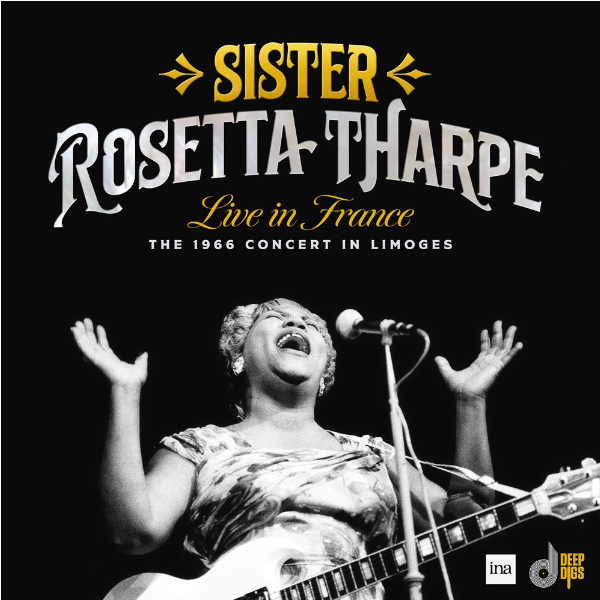
SISTER ROSETTA THARPE
LIVE IN FRANCE: THE 1966 CONCERT IN LIMOGES
180g 2LP (Deep Digs/Elemental)
SRP: $49.98
Limited edition of 1,800 (RSD First)
MUSIC: 10
SOUND: 9
Of the three recordings previewed/reviewed here, Sister Rosetta Tharpe’s Live in France: The 1966 Concert in Limoges is arguably the best-sounding. And, in some ways, it is the most fascinating, as it is also the simplest. Culled from previously unreleased soundboard recordings, this 180g 2LP RSD 2024 collection is about as stripped down and bare bones bluesy-pure as one might dream from what appears on the surface to be a gospel performance.
From the Elemental Music site, we learn a bit of what to expect from this new set: “Live in France: The 1966 Concert in Limoges is a previously unissued live solo recording of the ‘Godmother of Rock ’n’ Roll,’ Sister Rosetta Tharpe, captured at the auditorium of the Grand Theatre in Limoges, France on November 11, 1966. This is an official release on producer Zev Feldman’s new Deep Digs record label. It is released in partnership with Elemental Music, and in cooperation with the Sister Rosetta Tharpe Estate and INA France. Transferred from the original tape reels, this recording was restored and mastered by multi-Grammy Award-winning engineer Michael Graves at Osiris Studio, with lacquers cut by the legendary Bernie Grundman at Bernie Grundman Mastering Studios. The limited-edition 180-gram 2-LP edition (and deluxe CD) includes an extensive insert with rare photographs by Jan Persson, Hans Harzheim, Don Schlitten, and Burt Goldblatt; two sets of liner notes by American and French Tharpe biographers — Gayle Wald (Shout, Sister, Shout!: The Untold Story of Rock-and-Roll Trailblazer Sister Rosetta Tharpe) and Jean Buzelin (Sister Rosetta Tharpe: La femme qui inventa le Rock ’n’ Roll); as well as statements by Susan Tedeschi, Henry Rollins, Bonnie Raitt, Shemekia Copeland, Billy Gibbons, Brian Ray, and Rhea Hamilton.”
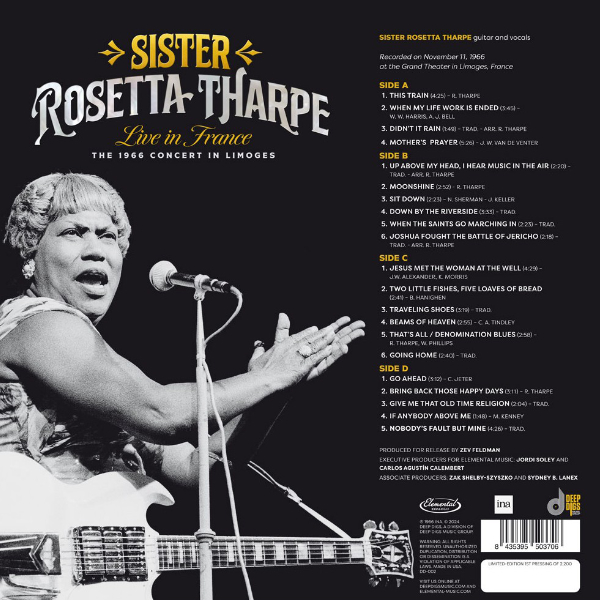
This digitally restored recording is remarkably modern-sounding, with a nice balance of crystal-clear vocals, concert-hall ambiance, and warm amplifier tones for Tharpe’s electric guitar accompaniment. There are also points when she is playing piano, such as on “Up Above My Head, I Hear Music in the Air” (Side 2, Track 1), and you can hear the squeak of (likely) her pressing the foot pedals — and perhaps the swing ’n’ sway of her piano seat as well. At other moments, you can feel the reverberation of her voice resonating out into the concert hall, especially on her frequent dramatic musical breaks-cum-sudden stops within the song arrangements.
This is a gospel concert only in name. If this set was performed in a seedy, smoke-filled, boozy bar, you might call this music the blues. But, unlike that artform’s often-tear-jerking sorrowful themes, Sister Rosetta Tharpe’s messages are hopeful and uplifting. Can there be a happy blues? I think so. In short, Live in France: The 1966 Concert in Limoges is a pure joy! Add it to your RSD 2024 list, I say.
Mark Smotroff is an avid vinyl collector who has also worked in marketing communications for decades. He has reviewed music for AudiophileReview.com, among others, and you can see more of his impressive C.V. at LinkedIn.
